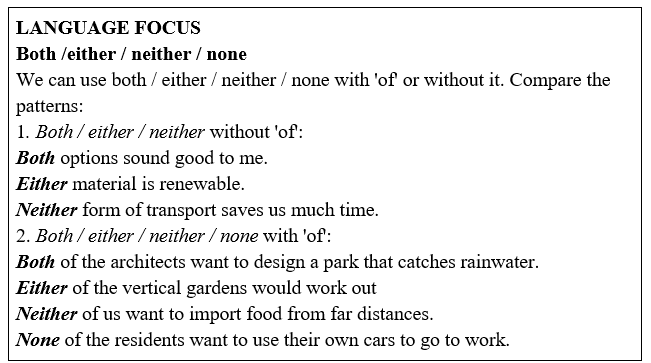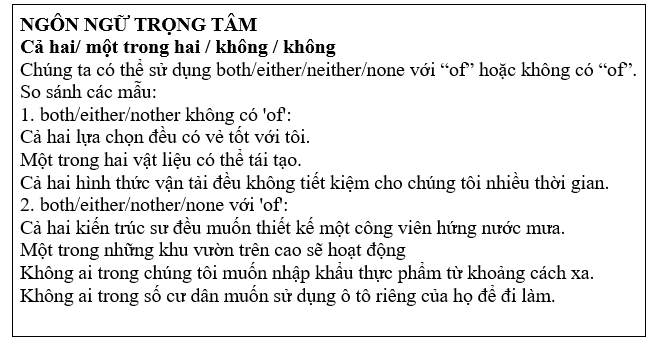Tiếng Anh 11 Unit 8 8.6 Use of English1. Look at the photos. Do you think urban farming will be more popular in big cities in the future? Why (not)? 2. Read the passage and tick (✓) True or False. 3. Study the LANGUAGE FOCUS. Then choose the best option to complete the sentences. 4. Rewrite the sentences using the words in brackets.
Lựa chọn câu để xem lời giải nhanh hơn
Bài 1 both, either, neither, none I can use both, either, neither, none to talk about problems in urban planning. (Tôi có thể sử dụng both, either, neither, none để nói về các vấn đề trong làm nông nghiệp ở thành thị) 1. Look at the photos. Do you think urban farming will be more popular in big cities in the future? Why (not)? (Nhìn vào những bức ảnh. Bạn có nghĩ rằng nông nghiệp đô thị sẽ phổ biến hơn ở các thành phố lớn trong tương lai? Tại sao không)?) Lời giải chi tiết: I think urban farming will be more popular in big cities in the future. In the picture, they are growing various kinds of plants. With the proper technology, farming can go anywhere. (Tôi nghĩ rằng nông nghiệp đô thị sẽ phổ biến hơn ở các thành phố lớn trong tương lai. Trong ảnh, họ đang trồng các loại cây khác nhau. Với công nghệ thích hợp, nông nghiệp có thể đi bất cứ đâu.) Bài 2 2. Read the passage and tick (✓) True or False.
More city dwellers are turning to urban farming in metropolises across the globe. Urban farming is involved with both growing food and raising animals and insects, such as chicken and bees. People are drawn to it because it either allows them to relax or connect with nature or to grow organic fruits and vegetables. Today's urban residents want to buy neither food treated with pesticides nor food imported from far away. T F 1. City dwellers in small towns are taking up urban farming. 2. Some urban farmers keep bees. 3. People find urban farming relaxing. 4. Most urban farms use pesticides. 5. Urban farming helps us become less reliant on importing food. Tạm dịch: Nhiều cư dân thành phố đang chuyển sang canh tác đô thị ở các đô thị trên toàn cầu. Nông nghiệp đô thị tham gia vào cả việc trồng trọt và chăn nuôi động vật và côn trùng, chẳng hạn như gà và ong. Mọi người bị thu hút bởi nó vì nó đem lại cho họ cảm giác thư giãn hoặc kết nối với thiên nhiên hoặc trồng các loại trái cây và rau hữu cơ. Cư dân đô thị ngày nay không muốn mua thực phẩm được xử lý bằng thuốc trừ sâu hay thực phẩm nhập khẩu từ xa. Lời giải chi tiết:
1. City dwellers in small towns are taking up urban farming. (Cư dân thành phố ở các thị trấn nhỏ đang làm nông nghiệp đô thị.) Thông tin: “More city dwellers are turning to urban farming in metropolises across the globe.” (Nhiều cư dân thành phố đang chuyển sang canh tác đô thị ở các đô thị trên toàn cầu. ) 2. Some urban farmers keep bees. (Một số nông dân thành thị nuôi ong.) Thông tin: “ Urban farming is involved with both growing food and raising animals and insects, such as chicken and bees.” (Nông nghiệp đô thị tham gia vào cả việc trồng trọt và chăn nuôi động vật và côn trùng, chẳng hạn như gà và ong.) 3. People find urban farming relaxing. (Mọi người thấy nông nghiệp đô thị thư giãn.) Thông tin: “People are drawn to it because it either allows them to relax or connect with nature or to grow organic fruits and vegetables.” (Mọi người bị thu hút bởi nó vì nó đem lại cho họ cảm giác thư giãn hoặc kết nối với thiên nhiên hoặc trồng các loại trái cây và rau hữu cơ.) 4. Most urban farms use pesticides. (Hầu hết các trang trại đô thị sử dụng thuốc trừ sâu.) Thông tin: “Today's urban residents want to buy neither food treated with pesticides nor food imported from far away.” (Cư dân đô thị ngày nay không muốn mua thực phẩm được xử lý bằng thuốc trừ sâu hay thực phẩm nhập khẩu từ xa.) 5. Urban farming helps us become less reliant on importing food. (Nông nghiệp đô thị giúp chúng ta bớt phụ thuộc vào việc nhập khẩu thực phẩm.) Thông tin: “Today's urban residents want to buy neither food treated with pesticides nor food imported from far away.” (Cư dân đô thị ngày nay không muốn mua thực phẩm được xử lý bằng thuốc trừ sâu hay thực phẩm nhập khẩu từ xa.) Bài 3 3. Study the LANGUAGE FOCUS. Then choose the best option to complete the sentences. (Học NGÔN NGỮ TRỌNG TÂM. Sau đó chọn phương án đúng nhất để hoàn thành câu.)
Tạm dịch:
1. Both/Both of megacities are trying to grow vertically. 2. Either/None of the urban farms are raising bees. 3. Either/Either of the hyperloops will be able to transport us across the city quickly. 4, Neither/Neither of maglev trains nor hyperloops are planned for our city yet. 5. All new condos in our city will have either/ either of an urban farm or a vertical garden. 6. Both of/Either the metropolises want more biodiversity and natural environments in their cities.
Lời giải chi tiết: 1. Both megacities are trying to grow vertically. (Cả hai siêu đô thị đều đang cố gắng phát triển theo chiều dọc.) 2. None of the urban farms are raising bees. (Không có trang trại đô thị nào đang nuôi ong.) 3. Either of the hyperloops will be able to transport us across the city quickly. (Một trong hai tàu siêu tốc sẽ có thể đưa chúng ta đi khắp thành phố một cách nhanh chóng.) 4, Neither maglev trains nor hyperloops are planned for our city yet. (Cả tàu đệm từ và tàu siêu tốc đều chưa được lên kế hoạch cho thành phố của chúng ta.) 5. All new condos in our city will have either of an urban farm or a vertical garden. (Tất cả các căn hộ mới trong thành phố của chúng tôi sẽ có một trang trại đô thị hoặc một khu vườn trên cao.) 6. Both of the metropolises want more biodiversity and natural environments in their cities. (Cả hai đô thị đều muốn có nhiều môi trường tự nhiên và đa dạng sinh học hơn trong thành phố của họ.) Bài 4 4. Rewrite the sentences using the words in brackets. (Viết lại các câu sử dụng các từ trong ngoặc.) 1. We can mine concrete and materials from the old buildings. [both] __________________________________________________. 2. Cars and busses don't use sustainable energy. [neither] __________________________________________________. 3. Please show your city plans to this architect or that architect. [either of] __________________________________________________. 4. The two overcrowded residential areas need to go green. [both of] ________________________________________________. 5. The room temperature and rainwater are monitored by computers. [both] __________________________________________________. Lời giải chi tiết: 1. We can mine concrete and materials from the old buildings. [both] (Chúng tôi có thể khai thác bê tông và vật liệu từ các tòa nhà cũ.) → We can mine both concrete and materials from the old buildings. (Chúng tôi có thể khai thác cả bê tông và vật liệu từ các tòa nhà cũ.) 2. Cars and busses don't use sustainable energy. [neither] (Ô tô và xe buýt không sử dụng năng lượng bền vững.) → Neither cars nor busses use sustainable energy. (Cả ô tô và xe buýt đều không sử dụng năng lượng bền vững.) 3. Please show your city plans to this architect or that architect. [either of] (Vui lòng đưa bản vẽ thành phố của bạn cho kiến trúc sư này hoặc kiến trúc sư kia) → Please show your city plans to either of the architects. (Vui lòng đưa bản vẽ thành phố của bạn cho một trong hai kiến trúc sư.) 4. The two overcrowded residential areas need to go green. [both of] (Hai khu dân cư đông đúc cần chuyển sang sống xanh.) → Both of the overcrowded residential areas need to go green. (Cả hai khu dân cư đông đúc đều cần sống xanh.) 5. The room temperature and rainwater are monitored by computers. [both] (Nhiệt độ phòng và nước mưa được theo dõi bằng máy tính.) → Both room temperature and rainwater are monitored by computers. (Cả nhiệt độ phòng và nước mưa đều được theo dõi bằng máy tính.) Bài 5 5. Imagine that you want to be an urban farmer. What problems will you have to face? In groups, make notes and present to the class. Use both, either, neither, none in your discussion. (Hãy tưởng tượng rằng bạn muốn trở thành một nông dân thành thị. Bạn sẽ phải đối mặt với những vấn đề gì? Theo nhóm, ghi chép và trình bày trước lớp. Sử dụng “both, either, neither, none” trong cuộc thảo luận của bạn.) I think we will have to care about both what to grow and where to grow our food. (Tôi nghĩ chúng ta sẽ phải quan tâm đến cả việc trồng gì và trồng thực phẩm ở đâu.) Lời giải chi tiết: I think we will have to care about none of the spaces in the cities. (Tôi nghĩ chúng ta sẽ phải quan tâm đến việc không có không gian trong thành phố.) We also have to care about both how to grow and how much it costs. (Chúng ta còn phải quan tâm đến cả cách trồng và chi phí bao nhiêu.)
|
















